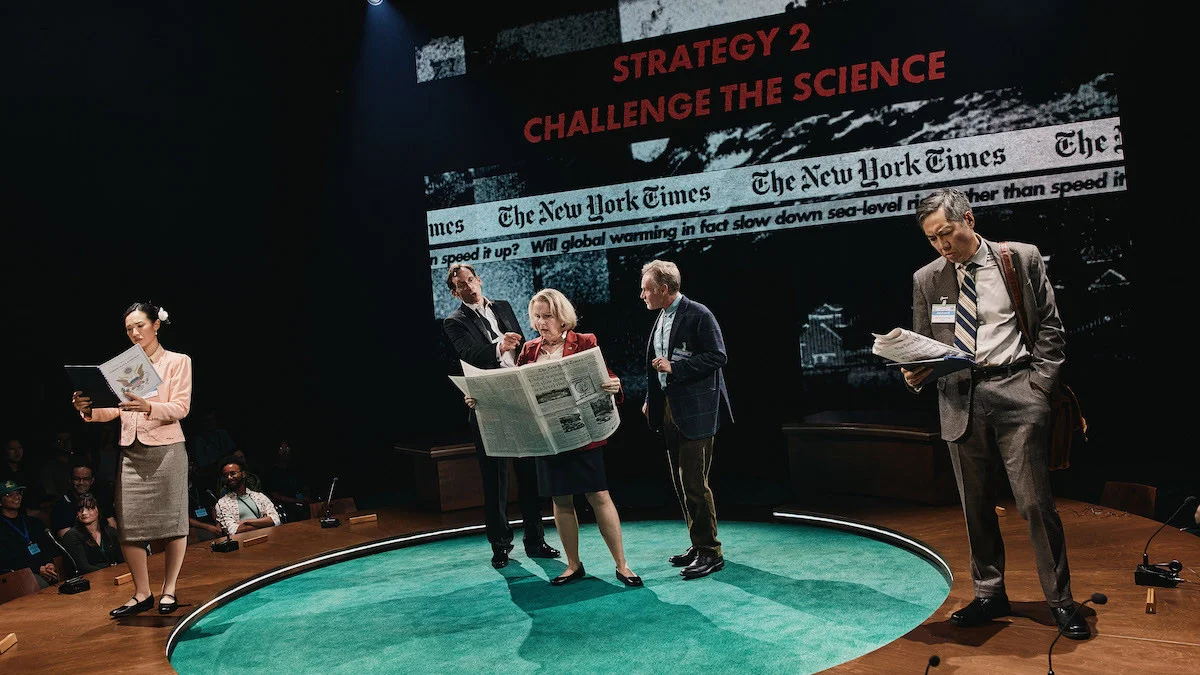Copyright thewrap

Whenever I see one of those polls on What’s Most Important, I never pick the economy, immigration, crime or even democracy. I always think climate change. In other words, I should be the prime theatergoer for “Kyoto,” the new play on why the United States failed to ratify the Kyoto Protocol to reduce greenhouse emissions. Also, Joe Murphy and Joe Robertson’s “Kyoto” was a big success in 2024 when presented by the Royal Shakespeare Company and Good Chance, and it’s easy to see why. The Americans in “Kyoto” are not only the villains. They’re also a bunch of very unattractive idiots. “Kyoto” had its U.S. premiere Monday at Lincoln Center’s Vivian Beaumont Theater, and it is yet another British import filled with Big Ideas served up on a sterile monolithic set that screams “prestige” even before you sit down. Over the years, I have felt this impending Major Cultural Event as I walked into the theaters serving up “Enron,” “Ink,” “Patriots” and even the 2025-26 theater season’s other U.K. to Broadway transfer, “Punch.” Those one-word titles help to emphasize an inherent glibness in the face of so many facts, since each play tells a true story. Big socio, financial and/or political debates are offered and become so complicated that these stories aren’t so much dramatized as they are told to us. The narrator of “Kyoto” is the villain, Don Pearlman (Stephen Kunken). He worked as an apparatchik in the Reagan administration and then turned into a Big Oil lawyer-lobbyist who went around the world shutting down any kind of meaningful action on climate change. I may agree with what Murphy and Robertson have to say about the inhumanity of people like Pearlman, which doesn’t mean I find Pearlman or any other character they’ve written of interest. In fact, there are no characters in “Kyoto,” only stick figures. Despite its two hours and 45 minutes, only one of the 19 characters manages to show a smidgen of development. She is Pearlman’s wife, Shirley (Natalie Gold), who is the most reactive female character to grace a New York stage in years. (And this from a play that pretends to offer a progressive view of humanity?) Murphy and Robertson turn Shirley Pearlman into a complete wife-supplicant — until an anonymous reporter (Daniel Jenkins) educates her. There are a lot of lectures in “Kyoto.” This particular ruler-waving talk has to do with the petroleum conference “Energy and Man” held at Columbia University in 1958. Big Oil knew all about their product’s link to climate change, and just like the cigarette companies with tobacco and cancer, they made sure to bury the bad news. It’s as if housewife Shirley had never read a newspaper, which is probably why this journalist has to spoon feed her the news. Quicker than Sarah Palin can say “Drill, Baby, Drill,” Shirley is a convert to the environmental cause and goes so far as to link her husband’s anti-planet crusade to his early death from smoking cigarettes. Shirley’s treacly speech is the kind of writing that gives agitprop a bad name. Kyoto is not the only climate conference featured. One takes place in Brazil and the delegates are entertained by a production of “A Midsummer Night’s Dream,” directed by German auteur Werner Herzog. No matter that this show within the show looks more like Julie Taymor than anything by the director of “Fitzcarraldo.” It’s splashy, it’s eye-catching and makes you wish you were at a play by Shakespeare instead. Otherwise, watching these debates about climate over a conference table is about as riveting as watching anything that goes on at the United Nations. To fill the void, directors Stephen Daldry and Justin Martin have instructed their ensemble of 14 actors to yell their lines and overact, which is made worse since many of the characters have a foreign accent — and that includes the redneck twang coming from Al Gore (Jenkins again). In case you fall asleep, someone sitting at the huge circular conference table that is the stage (scenic design by Miriam Buether) holds a gavel and he or she keeps slamming it against that table. This gavel is also used to build suspense. During the Kyoto conference, Pearlman says he hasn’t slept for 72 hours, which remains a mystery because he has done nothing in his life except prevent anything from happening. Playing Pearlman, Kunken becomes more and more frantic. The other actors start screaming even louder. And that damned gavel hits the table over and over and over again. Near the end of “Kyoto,” Pearlman attempts to instill guilt by giving the audience yet another lecture. He tells us we’re all responsible for what’s wrong with the environment if we even use an electronic appliance, much less ride in a car or fly in an airplane. It’s an old argument and one that Jack Lemmon delivers with far more conviction in “The China Syndrome.”



